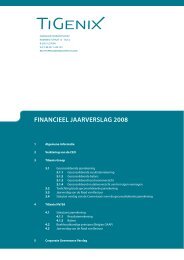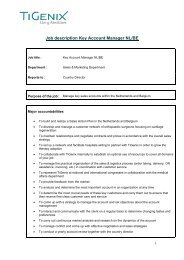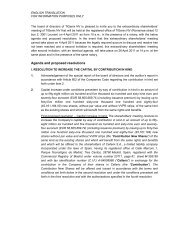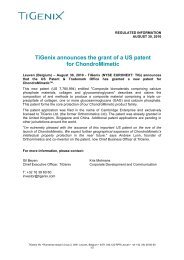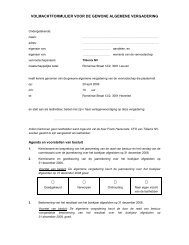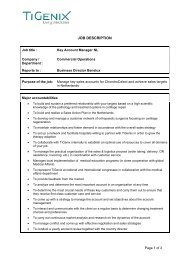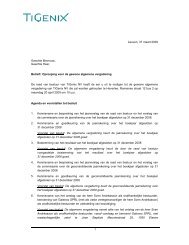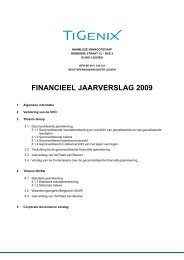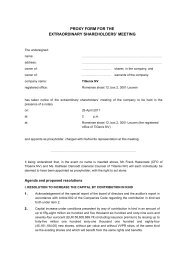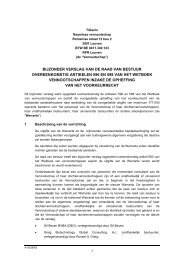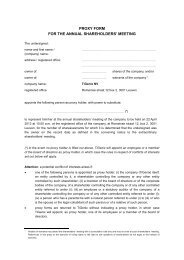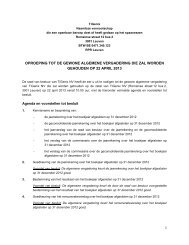ANNUAL REPORT 2012 - TiGenix
ANNUAL REPORT 2012 - TiGenix
ANNUAL REPORT 2012 - TiGenix
Create successful ePaper yourself
Turn your PDF publications into a flip-book with our unique Google optimized e-Paper software.
elated fistulas were administered Infliximab<br />
at induction at weeks 0, 2 and 6. Patients who<br />
had ongoing fistula response to the drug at<br />
week 14 were re-randomized and placed on<br />
a maintenance regimen administered every<br />
8 weeks thereafter. By the end of the trial,<br />
36 % of the patients that went on to receive<br />
a maintenance therapy continued to be in<br />
complete remission. If remission after initial<br />
induction is taken into account, efficacy of<br />
Infliximab at 1 year is limited to 23 % (only 48 %<br />
of patients evaluated after induction therapy<br />
achieved a complete remission). Remission<br />
is hereby defined as complete healing. This<br />
is thus in large contrast with the results of<br />
<strong>TiGenix</strong>’s Phase II study using Cx601, in which<br />
56 % of treated fistula tracts healed (complete<br />
closure and re-epithalization of external<br />
opening) after 24 weeks.<br />
Humira maintenance trial (“CHARM”).<br />
Efficacy results were 33 % rate of complete<br />
closure at 56 weeks.<br />
- Cimzia (certolizumab) - UCB : Although not<br />
developed for the treatment of fistulizing<br />
Crohn directly, fistula healing was a<br />
secondary endpoint in one of Cimzia’s<br />
maintenance trials (PRECISE 1) and a small<br />
number of patients in PRECISE 2 also had<br />
fistula as a baseline. In none of the two<br />
trials did Cimzia outperform efficacy of<br />
placebo. The EMA refused the Marketing<br />
Authorisation for Cimzia to treat active<br />
Crohn’s disease. Nevertheless, Cimzia<br />
received FDA approval for treating adults<br />
with moderate to severe Crohn’s disease<br />
who have not responded to conventional<br />
therapies.<br />
Other biologics being used in the treatment<br />
of luminal Crohn (but not specifically<br />
approved for the treatment of fistulizing<br />
Crohn) are :<br />
- Humira (adalimumab) - Abbott : Second<br />
generation anti TNF, which has been<br />
approved for the treatment of Crohn’s<br />
disease (but not fistulizing Crohn’s).<br />
Humira has the advantages of requiring<br />
only subcutaneous dosing (instead of<br />
intravenous infusion) and being a fully<br />
human antibody. Fistula healing was<br />
studied as a secondary endpoint in the<br />
- Tysabri (natalizumab) – Elan-Biogen :<br />
Approved by the FDA (not by the EMA)<br />
for the treatment of moderate to severe<br />
Crohn’s disease. However, Tysabri is not<br />
effective in the treatment of fistulizing<br />
Crohn’s disease and the ENACT-1, ENACT-2<br />
and ENCORE trials all specifically excluded<br />
patients with active fistulas.<br />
- An interesting note is that not all<br />
TNF- -neutralizing medication is effective<br />
in treatment of Crohn’s disease as Enbrel<br />
(etanercept) has proven to be worse than a<br />
placebo in Crohn’s disease.<br />
70 <strong>TiGenix</strong> I annual report <strong>2012</strong>



